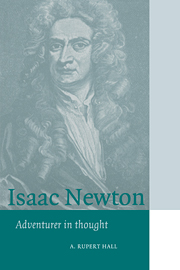Book contents
- Frontmatter
- Contents
- List of Figures
- General Editor's Preface
- Foreword
- Acknowledgement
- 1 The Hopeful Youth, 1642–1664
- 2 “The prime of my age for invention”, 1664–1667
- 3 Widening Horizons, 1667–1669
- 4 The Professor of Mathematics, 1669–1673
- 5 Publication and Polemic, 1672–1678
- 6 Life in Cambridge, 1675–1685
- 7 The Chemical Philosopher, 1669–1695
- 8 The Mathematical Principles of Natural Philosophy, 1679–1687
- 9 Private and Public life, 1685–1696
- 10 Fluxions and Fury, 1677–1712
- 11 Opticks, or a Treatise of Light, 1687–1704
- 12 Life in London, 1696–1718
- 13 A Man of Authority and Learning, 1692–1727
- 14 Later Books, 1706–1726
- 15 Kensington, 1725–1727
- Appendices
- Notes
- Bibliography
- Index
4 - The Professor of Mathematics, 1669–1673
Published online by Cambridge University Press: 12 January 2010
- Frontmatter
- Contents
- List of Figures
- General Editor's Preface
- Foreword
- Acknowledgement
- 1 The Hopeful Youth, 1642–1664
- 2 “The prime of my age for invention”, 1664–1667
- 3 Widening Horizons, 1667–1669
- 4 The Professor of Mathematics, 1669–1673
- 5 Publication and Polemic, 1672–1678
- 6 Life in Cambridge, 1675–1685
- 7 The Chemical Philosopher, 1669–1695
- 8 The Mathematical Principles of Natural Philosophy, 1679–1687
- 9 Private and Public life, 1685–1696
- 10 Fluxions and Fury, 1677–1712
- 11 Opticks, or a Treatise of Light, 1687–1704
- 12 Life in London, 1696–1718
- 13 A Man of Authority and Learning, 1692–1727
- 14 Later Books, 1706–1726
- 15 Kensington, 1725–1727
- Appendices
- Notes
- Bibliography
- Index
Summary
Newton's Teaching in Cambridge
The greater part of Newton's original work in mathematics and science was first expressed in the form of university lectures. This is true of his researches in geometrical and experimental optics, of his discoveries in theoretical and celestial mechanics, and of his investigations in algebra and some other parts of mathematics. He never lectured upon calculus, no doubt believing that this topic was far beyond the reach of his student auditors; and he did not lecture either upon his chemical, alchemical, biblical and historical studies, not only for the reason that they lay far outside the scope of his professorship. The details of Newton's lecturing are formally known to us from the manuscripts of his optical lectures (in two versions), of the Arithmetica universalism and of the De motu corporum which he submitted to the University Library in accordance with the statutes of his professorship – or nearly so! These statutes, indeed, required the Lucasian Professor of Mathematics to deliver upwards of twenty lectures in each academic year, neatly written copies of ten of them to be deposited with the vice-chancellor in the following year. But although these statutes had been drawn up only in 1663, when the professorship was founded by Henry Lucas, their provisions were at once disobeyed. While his predecessor, Isaac Barrow, had probably lectured in two terms of each year, Newton went to the Schools in one only, half an hour being reckoned a near enough approach to the statutory ‘about one hour’.
- Type
- Chapter
- Information
- Isaac NewtonAdventurer in Thought, pp. 90 - 115Publisher: Cambridge University PressPrint publication year: 1996

